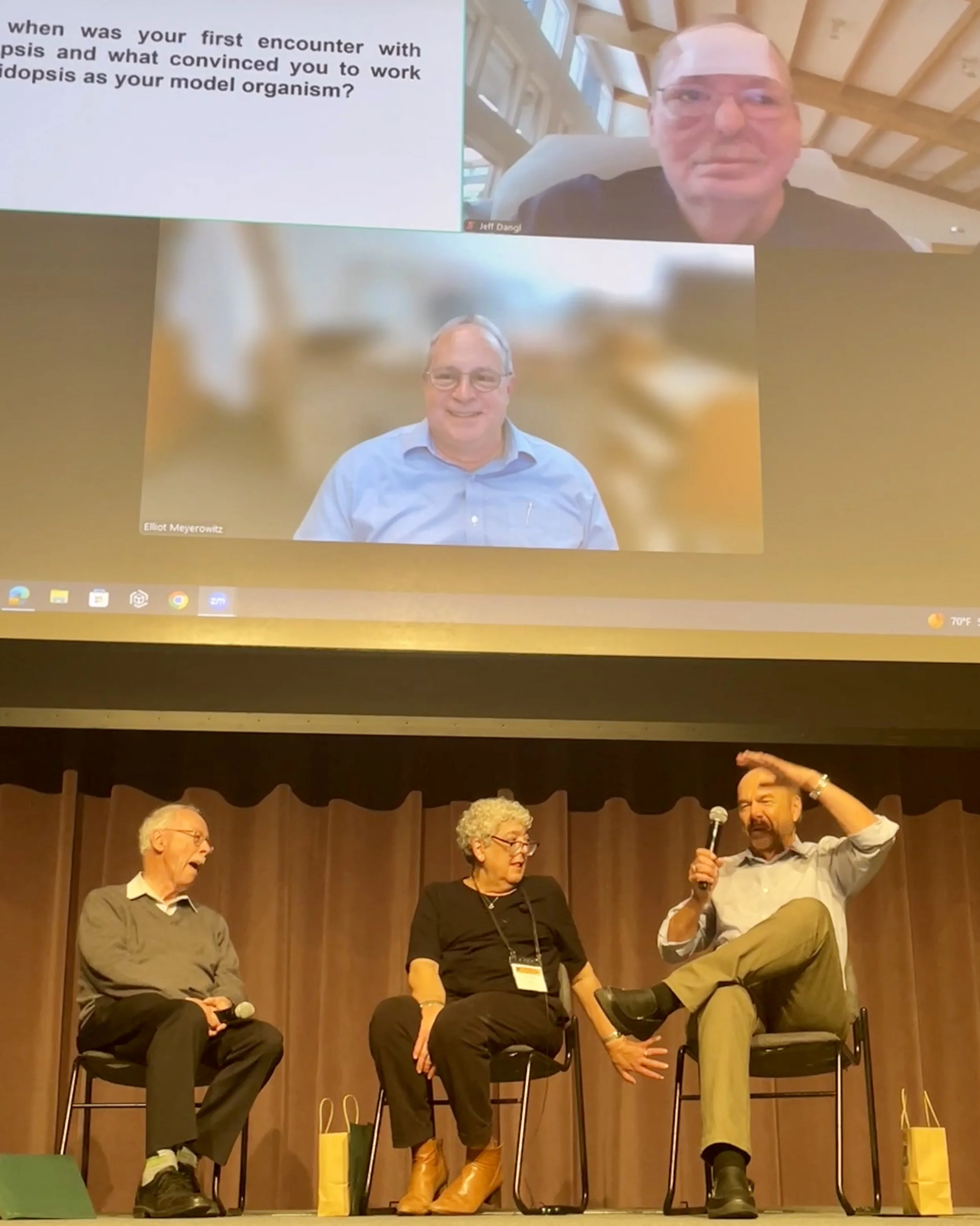The community mourns the passing of Joanne Chory, renowned scientist, beloved mentor, founding NAASC member & Arabidopsis lifetime achievement awardee
Left to Right: Joanne Chory (Salk Inst.), Chris Somerville (Emeritus UC Berkeley and Open Philanthropy), Joe Ecker (Salk Inst.), and Adrienne Roder (Cornell University and NAASC/ICAR 2024 organizing committee)
July 19, 2024, following the inaugural Philip N. Benfey NAASC Arabidopsis Community Lifetime Achievement Award panel held at the conclusion of the 34th International Conference on Arabidopsis Research (ICAR 2024). Location: University of California, San Diego. Awardees not shown, that joined. virtually: Jeff Dangl (University of North Carolina, Chapel Hill) and Elliot Meyerowitz (Cal Tech)
NAASC notes with deep sadness the passing of Dr. Joanne Chory of the Salk Institute for Biological Studies. Joanne is a beloved community member and mentor, founding member of NAASC, vibrant intellectual, and recent awardee of an inaugural Philip N. Benfey Arabidopsis Community Lifetime Achievement Award and the 2024 Benjamin Franklin medal. This April 2024 video about Dr. Chory- with personal and professional reflections- was published in honor of being awarded the 2024 Benjamin Franklin Medal in Life Science.
Dr. Chory was a Keynote speaker at the International Conference on Arabidopsis Research (ICAR) in 2021 where she presented research from the “Harnessing Plants Initiative” (HPI), previously featured in a Ted Talk (2019).
Dr. Chory was most recently a featured panelist on the lifetime achievement award panel during the closing event of ICAR 2024 this past July in San Diego. During ICAR 2024, past and present Chory lab members gathered with Dr. Chory to celebrate her lifetime of groundbreaking plant science and their shared experiences across decades.
Dr. Chory was a founding member (1992-1996) of the North American Arabidopsis Steering Committee (NAASC) serving with Elliot Meyerowitz, Chris Somerville, Fred Ausubel, Joe Ecker, and David Meinke.
“Working with Arabidopsis thaliana, a small mustard plant and favorite laboratory model, Chory pioneered the application of molecular genetics to plant biology. She used emerging tools to reveal how plants alter their size, shape, and form to optimize growth and photosynthesis in various environments.” (Official Salk Institute press release)
Our heartfelt best wishes go to her family, her colleagues, her current and former lab members and all others that she impacted throughout her long career.
She will be deeply missed.
Joanne Chory, center, bottom, was a featured panelist during the NAASC Philip N. Benfey Arabidopsis Community Lifetime Achievement Award Panel at ICAR 2024.
Additional awardees and panelists include Jeff Dangl (top right, University of North Carolina, Chapel Hill), Elliot Meyerowitz (top, middle, Cal Tech), Chris Somerville (bottom left, University of California, Berkeley (emeritus) and Open Philanthropy LLC) and Joe Ecker (bottom right, Salk Institute)
Dr. Chory is most famous for her groundbreaking work on light perception and signaling, chloroplast-nucleus communication, brassinosteroid production and signaling, and auxin biosynthesis in Arabidopsis, as well as her more recent leadership role in in the “Harnessing Plants Initiative” (HPI) that leverages plant genetics to combat climate change. The HPI is “an innovative, scalable and bold approach to fight climate change by optimizing a plant’s natural ability to capture and store carbon and adapt to diverse climate conditions.”
“Dr. Chory trained over 100 graduate students and postdocs, many of whom now successfully lead their own groups in academia and industry. She was an inspirational role model and has shown the world that it is possible to successfully combine doing great science with raising a beautiful family.
I loved being in Joanne’s lab, and am so excited to see her honored with this award. If I was to sum up Joanne’s mentoring style in three bullet points, they would be: 1) Don’t let your ego interfere with your science. Follow the data and find the mechanism; 2) Be brave. Try out lots of ideas, some of them kind of far-fetched; and 3) Surround yourself with people that love science, and remember not to take yourself too seriously. This is supposed to be fun!”
“Dr. Chory is one of the most influential plant biologists of our time. Chory is a professor at the Salk Institute for Biological Studies since 1988 and has been an Howard Hughes Medical Institute investigator since 1997.Dr. Chory uses Arabidopsis as a genetic model to study fundamental plant biology in the field of plant hormone biology and photobiology. Dr. Chory pioneered the use of Arabidopsis forward genetics approach to identify mutants in the light and hormonal regulation of plant growth and development. These genetics studies helped establish plant steroid hormone brassinosteroid biosynthesis and signaling pathways including key enzymes in the biosynthesis pathway, receptors, signaling intermediates and downstream transcription factors. Her work also provided insight into the light regulation of plant processes, including genes involved in light perception and signal transduction, photomorphogenesis and chloroplast-nuclear retrograde signaling. Dr. Chory is currently leading Harnessing Plants Initiative (HPI) with the ultimate goal of reducing CO2 and combating climate changes with support from TED Audacious Project and Bezos Earth Fund. She has published nearly 300 papers, which has been cited more than 85,000 times. Dr Chory has trained over 100 postdoctoral fellows and graduate students, and more than 50 of her trainees have become successful and independent investigators worldwide. She was elected as Member of the U.S. National Academy of Sciences in 1999, Associate Member of EMBO in 2006, Member of German Academy of Sciences in 2008, Foreign Associate of Académie des Sciences of France in 2009, Foreign Member of the Royal Society in 2011. She has won numerous prestigious awards including Charles Albert Schull Award from American Society of Plant Biologists in 1995, Kumho Award in Plant Molecular Biology in 2004, Breakthrough Prize in Life Sciences in 2018, Gruber Prize in Genetics in 2018 and Princess of Asturias Award for Technical and Scientific Research in 2019.”


